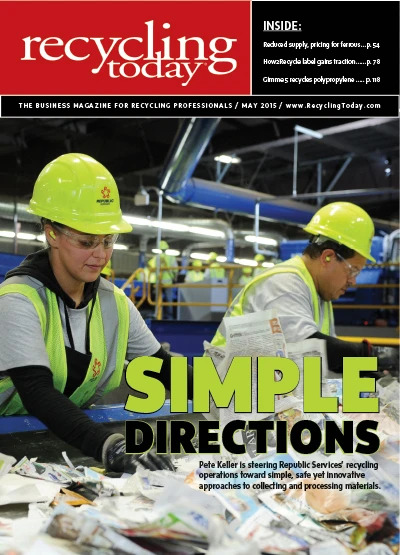|
|
We all likely can agree that a quality education is a critical factor that contributes to an individual’s quality of life and career success in his or her adult life. We also likely can agree that quality educational materials contribute to the overall success of municipal recycling programs by reducing contamination and increasing diversion of desirable materials. Despite this agreement, a number of speakers across numerous panels at the 2014 Paper & Plastics Recycling Conference, which the Recycling Today Media Group hosted in Chicago last October, voiced their opinions that recycling education appeared to be lacking in many residential recycling programs. For instance, Cal Tigchelaar of Resource Management Cos., Chicago Ridge, Illinois, told attendees that he had lived in the same Chicago-area community for 20 years and had “yet to see a flier or card telling me what I can and can’t recycling.” Lack of adequate education combined with programs that reward volume and the transition to automated collection trucks, Tigchelaar said, have led to the presence of clothing, shoes, garden hoses, Christmas lights, toddler gates and even engine blocks on the tipping floors of his material recovery facilities (MRFs). While a variety of speakers from MRF operators to consumers of recyclables pointed to the need for more robust education efforts for residential recycling programs, they were less certain about which stakeholder or combination of stakeholders should foot the bill for these measures. A number of MRF operators have taken on this responsibility by adding to their facilities education centers that are geared toward teaching children about the benefits of recycling. ReCommunity even has added an “Education Station” to its website that includes lesson plans for grades one through five and six through 12. Some trade associations also have tried their hands at recycling education. The Institute of Scrap Recycling Industries (ISRI), for example, has partnered with JASON Learning on a national recycling awareness campaign to help students and educators learn the importance of recycling and the recycling industry, as well as the science, technology, engineering and math (STEM) topics related to recycling. ISRI says the campaign “includes rich, standards-based, multimedia curricular experiences for students in grades K-12.” And, of course, The Recycling Partnership (né the Curbside Value Partnership), is known for its work with local governments to increase residential recycling using strategic messaging. The importance of recycling education and the resources that are available to the industry are topics the Recycling Today Media Group plans to devote a session to at our 2015 Paper & Plastics Recycling Conference, which is Oct. 14-16 in Chicago. Follow our Twitter hashtag, #PPRC2015, to receive speaker updates in real time. |

Explore the May 2015 Issue
Check out more from this issue and find your next story to read.
Latest from Recycling Today
- Aqua Metals secures $1.5M loan, reports operational strides
- AF&PA urges veto of NY bill
- Aluminum Association includes recycling among 2025 policy priorities
- AISI applauds waterways spending bill
- Lux Research questions hydrogen’s transportation role
- Sonoco selling thermoformed, flexible packaging business to Toppan for $1.8B
- ReMA offers Superfund informational reports
- Hyster-Yale commits to US production






